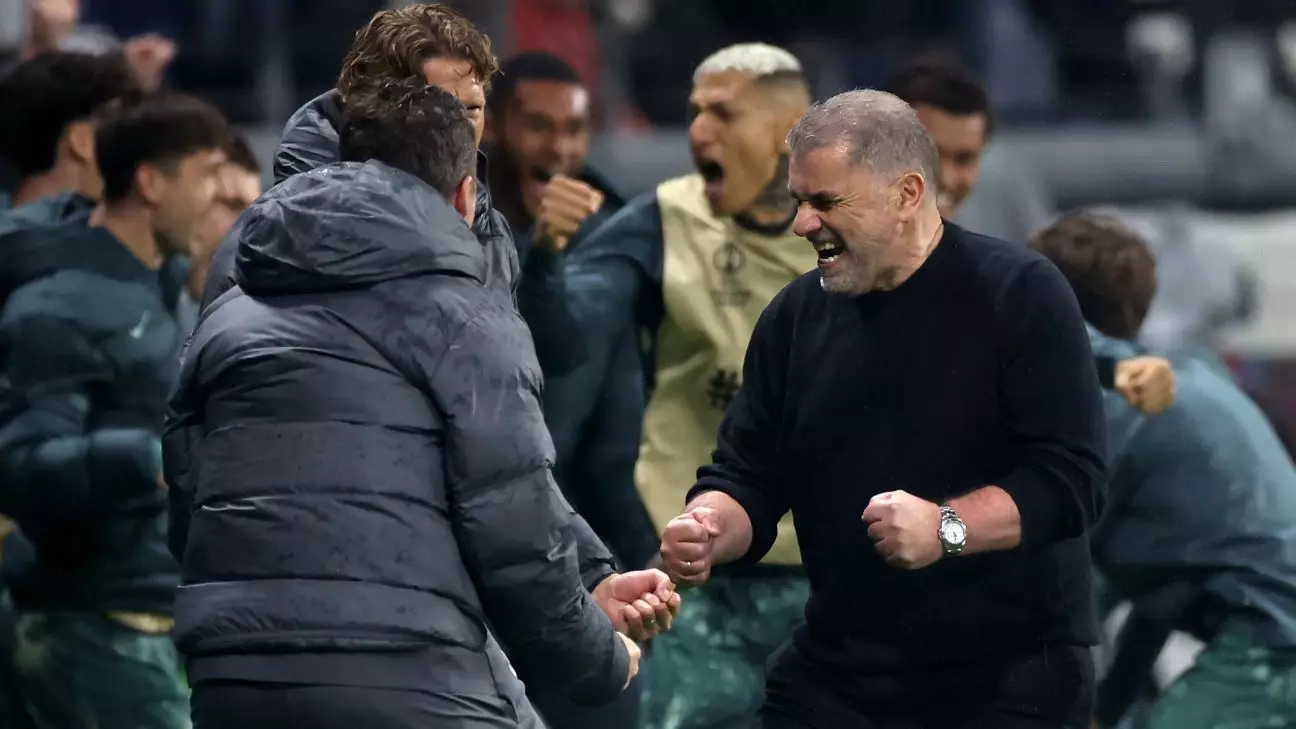In a season characterized by turmoil, uncertainty, and wavering faith from fans and critics alike, Tottenham Hotspur’s recent UEFA Europa League victory provides a glimmer of hope for both the club and its coach, Ange Postecoglou. Having faced the possibility of dismissal under a dark cloud of discontent, Postecoglou’s men triumphed against Eintracht Frankfurt in a quarterfinal match, which has now opened a pathway toward potential silverware. This significant win not only bolstered Spurs’ morale but also reasserted Postecoglou’s belief in his own vision for the team during a season that many believed was slipping away.
Tottenham’s success in Frankfurt—a gritty 1-0 victory that amassed a 2-1 aggregate score—demonstrates that resilience can prevail even amidst the chaos. The narrative surrounding Postecoglou had grown increasingly tense as the team struggled through a rough patch, losing seven out of their last twelve games. Yet, in a pivotal moment, it was Dominic Solanke’s penalty kick that transformed a potentially disastrous season into the opportunity for a second chance, reaffirming the philosophy that with belief and perseverance, one can overcome even the steepest of challenges.
A New Tactical Approach
Postecoglou has long been known for his commitment to an expansive, attacking style of football, but criticism arose when results began to falter. Observers frequently described Tottenham’s tactics as style over substance, leading to questions about whether the team could adapt or evolve in answering the substantial demands of modern football. However, this Europa League night marked a noticeable shift as Spurs not only showcased attacking prowess but also a defensively solid nature that has been missing in recent months.
The coach fielded nearly his strongest lineup for the match, with only captain Heung-Min Son and Radu Dragusin absent. This unity and strength allowed Spurs to execute a game plan that was not only effective but indicative of the team’s potential when key players are fit. The players showed considerable awareness and structure against Eintracht Frankfurt, an aspect often cited as the missing piece in the Spurs’ jigsaw puzzle. The commitment and discipline displayed—from Guglielmo Vicario in goal to Rodrigo Bentancur in midfield—reinforced Postecoglou’s belief that his squad could achieve great things when operating at full capacity.
The Road Ahead: A Balancing Act of Optimism and Caution
Despite this victory instilling newfound hope, Postecoglou faces a dizzying test ahead. The upcoming fixture list presents substantial challenges, with matches against Nottingham Forest, a high-stakes encounter with Liverpool, and a traditional London derby against West Ham United. Each game holds its own pressures and potential pitfalls that could nullify the positivity generated from the Europa League success. Maintaining momentum will be critical not just to their league ambitions but also in ensuring they approach the semifinal against Bodø/Glimt with confidence rather than trepidation.
The task extends beyond just winning games; Postecoglou must also manage the psyche of a team still haunted by the specter of past failures. Tottenham’s reputation for underperformance in high-pressure situations looms large, providing an additional layer of complexity to their pursuit of glory. Every decision made in the lead-up to the semifinal and subsequent league fixtures will be scrutinized, as the expectancy among fans for a winning mentality grows louder.
The Stakes of Silverware
Postecoglou has a well-documented history of winning trophies in his second season at clubs—an assertion he reiterated in the wake of this triumph. The idea is enticing, and the prospect of silverware brings with it a pressure that could either motivate or suffocate. A culmination of events now positions Tottenham on the brink of redemption, dangling the prospect of silverware within reach.
A semifinal appearance signifies progress, yet the coach must guard against complacency. There is a notable difference between being a hopeful contender and a legitimate trophy-winner, and the path to solidifying that distinction is fraught with considerable challenges. The raw emotion seen on Postecoglou’s face at the final whistle against Frankfurt epitomizes the high stakes at play—this victory may have buoyed his position, but it is merely the first step toward an even greater goal that eludes him and his team.
In many ways, the Europa League journey reflects a microcosm of Postecoglou’s tenure at Tottenham thus far: filled with ups and downs, questions of style adaptively clashing with results, and ultimately, a narrative that is still being written. This chapter, however, is imbued with a sense of renewed potential—a narrative twist that could bring forth the triumph that has thus far remained tantalizingly out of reach.

